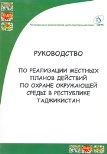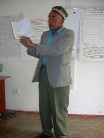FOUNDATION TO SUPPORT CIVIL INITIATIVES
The Foundation to Support for Civil Initiatives (FSCI, Dastgiri Center) is a voluntary public organization created by a group of enthusiasts in 1995. The main mission of the FSCI is to support the development of the civil sector of the republic through the implementation of environmental initiatives aimed at environmental protection, green economy, sustainable development, development and implementation of natural resource management programs, chemical safety.
The mission of the FPGI is realized by providing the following types of services:
- Information and advisory
- Analytical and expert works
- Development and implementation of projects
The long – term activity of the FSC can be characterized by the following stages of activity:
– Consulting and expert organization for the implementation of the local environmental management program in the Republic,
– Member of the Coalition of Civil Society Organizations of Tajikistan “Transparency for Development” – EITI (Extractive Industries Transparency Initiative),
– Member of the NGO Coordination Group for the Implementation of the UN Convention to Combat Desertification in the Republic of Tajikistan,
– Representative in Tajikistan of the International Organization “Earth Charter” and the Earth Charter Secretariat,
– Member of the International Information Network for the Elimination of Chemical Pollutants (IPEN),
– Member of the Expert Council for the GEF/UNDP Small Grants Program implemented in Tajikistan,
– Coordinator of the International Information network in Tajikistan “Trade and Sustainable Development”,
– Coordinator from NGOs of Tajikistan in the international organization “Strategic Approach to International Chemicals Management”,
– Performing the functions of the Secretariat of the Public Council of the Republic of Tajikistan under the Interstate Commission for Sustainable Development of Central Asian Countries, a member of the working group on the implementation of the International Aarhus Convention in the Republic of Tajikistan, a member of the Coordinating Council under the Administration of the City of Dushanbe for the implementation of the project “Solid Waste Management of the Dushanbe city”, etc.
In 1996, Foundation to Support for Civil Initiatives has become a member of the Public Council of the Republic of Tajikistan, headed by the President of the Republic, whose goal is to promote the country’s civil society to carry out socio-economic reforms and democratic changes, strengthen civil peace and harmony in the country.
FSCI is a member of international, regional and national information networks: the coalition of European Environmental NGOs “Eco-Forum”, the International Network for the Elimination of POPS (IPEN), the International Socio-Ecological Union, the Alliance of European NGOs (ANPED), the Central Information Network “City of the Future”, The International Network on Climate Change (CAN-EECCA), the CA network for capacity building in the field of water resources CAR@WAN. FSCI is a member of the Network of Environmental NGOs of Tajikistan, the information regional CA network on chemical safety, EITI, a number of other information public networks on international, Central Asian and national levels.
The FSCI actively cooperates with public organizations in Central Asia, in the Russian Federation, in Europe. One of the most important priorities in its activities is the creation of partnerships with government agencies, state and local executive authorities in order to facilitate the development and implementation of national and local development programs.
The activities of the FSCI are regularly covered in various publications, bulletins, magazines, websites, both in the republic and abroad. The FSCI publishes its own bulletins, which reflect the results of the conducted research and are distributed free of charge among public, governmental and international organizations. All printed publications published by the FSCI are open for free access on the website of the FSCI, under the heading “Publications”.
The FSCI carries out information and consulting activities for NGOs in the republic, provides expert and analytical services, implements projects both at its own expense and with the financial support of international organizations: UNDP, the European Commission in the Republic of Tajikistan, the Asian Development Bank, the International Secretariat of the Convention to Combat Desertification, the United Nations Environmental Protection Organization (UNEP), the Global Environment Facility (GEF), the Regional Environmental Center for Central Asia, the European Bank for Reconstruction and Development, the International POPS Elimination Network (IPEN), the Institute environmental entrepreneurship (Basel, Switzerland), etc.
FSCI has good technical equipment, e-mail, Internet. The organization has been a legal entity since June 1, 1995 (re-registration on June 12, 2008), has bank settlement and currency accounts.
FSCI, Dastgiri Center invites all interested organizations to cooperate and partner.
What we do
- Informational and consulting support to public and grassroots organizations with social-ecological profile which includes the following:
- Informational, research and consulting assistance with the implementation of various programs;
- Assistance with organizing seminars, training workshops and meetings to further enhance the capacity of public organizations; increase the awareness of public organizations and grassroots groups of the FSCI projects in the areas of environmental policy and sustainable development;
 |
 |
 |
- Public library for social organizations;
 |
 |
 |
- Publication of bulletins and brochures;
 |
 |
 |
- Support with the establishment of new environmental grassroots groups;
- Support with organizing initiatives related to the environment.
 |
 |
 |
2. Local environmental management and ecosystem services
In 2003, with the support of the Regional Ecological Center of Central Asia (REC CA), FSCI began working on the “Local Ecological Management (LEM) or Local Environment Action Plans (LEAP)” program. As the winner of the contest, FSCI became the national coordinator of the LEAP program in the RT. At present, LEAP related activities are financed by FSCI means, local authorities support and through international donations.
LEAP’s goals are: to identification and resolving of significant ecological problems, creation an official document for environmental problems management, which is meant to attract government and foreign investments. It includes plans for social-economic development of the territories. The document is created as a result of collaboration of governmental authorities and civil society and has been officially approved by local authorities. Since the implementation of the program, LEAP methodology has been widely acknowledged and replicated by other public organizations in partnership with local governmental authorities.
 |
 |
 |
Since 2003, FSCI has implemented a number of pilot projects as part of the LEAP program:
- Increased focus on the local environmental management program in the RT (REC CA, FSCI);
- Project “ Dushanbe: Program on Environmental Management”, 2004-2005 (REC CA, Committee on Environment Protection of the Republic of Tajikistan, FSCI). The project “ Dushanbe: Program on Environmental Management” was selected by the International Agency in 2007 as the best national project and received the Energy Globe (international award for sustainability, Brussels, 2007). ;
- Guidance “The implementation of the LEAP program in the Republic of Tajikistan”, 2007 ( REC CA, FSCI);
- LEAP School, 2008 (REC CA, FSCI);
- Project “Development of an Environmental Management Programme to facilitate the Sustainable Development of the Varzob region of the RT”, February 2009 – April 2010. (European Commission in the Republic of Kazakhstan, Kyrgyz Republic and Republic of Tajikistan, FSCI, Executive authority of Varzob district of the Republic of Tajikistan)
 |
 |
 |
 |
 |
 |
In the future, FSCI plans to form a partnership with the Ministry of Economic Development and Trade of the RT to address environmental issues in the programs on socio-economic development of the cities and regions. Planning for and implementing the Local Agenda – 21 will be in the future one of the most important projects of the FSCI and state authorities’ joint work both on national and local levels.
Since 2010, FSCI has conducted research on the most important methods of environmental management, i.e. assessment of ecosystem services (ES). ES are very important for the environment and sustainable development of territories. However, they haven’t been identified and included in the decision-making process.
3. Desertification and land degradation
Since 2000, FSCI has been the expert from Tajik NGO sector in implementing the UN Environmental Convention on Combat Desertification in the country. The main objective of the FSCI work is to increase NGOs’ involvement in the implementation of the UN Convention on Combat Desertification as well as international and state projects on decreasing land degradation. They achieve this objective by working on joint projects, sharing information, offering seminars and training workshops with other public organizations.
FSCI land degradation and desertification combat projects include the following:
“Findings on the fight against land degradation and improvement of sustainable land management in South-West of Hatlon region of RT”. FSCI is involved in capacity building, design of modules and organizing training seminars to raise public awareness and planning for Department on Land Degradation of Nuri Vahsh Jamoat, Jilikul district, Hatlon region of RT, 2007-2008. (UNDP, GEF, FSCI);
- “Mobilization and capacity building of pilot communities of South-West Hatlon for introducing sustainable land resource management”, 2006-2007. ( UNDP, Global Mechanism of Convention on Desertification Combat, FSCI);
- “Increased involvement of civil society in the issues related to land degradation and poverty in the context of the United Nations Convention on Combat Desertification”, (Drynet). 2008-2009 (Both-ends, REC CA, FSCI).
 |
 |
 |
The program on desertification and land degradation is contingent on resolving social problems and reducing poverty. In the future, FSCI plans to include the issues of land degradation in the document on the strategy of reducing poverty in the RT as well as other strategic programs on sustainable development.
4. Waste management and chemical safety
FSCI has been an official member of the international network (IPEN) on eliminating Persistent Organic Pollutants (POPs) since 2008. As part of this network, FSCI conducts expert research on the use of POPs, solid household waste management. It raises awareness among all sectors of society around the utilization of POPs.
As part of the IPEN program in 2008, FSCI conducted research and implemented the project on illegal use and trade of pesticides in Tajikistan in partnership with the Russian NGO “Eco-Consent”. FSCI and Eco-Consent conducted a round table discussion on DDT problems and organic agriculture organized by and aired on the First Channel of the national TV. The project findings on the illegal pesticide trade were included in the NGO Best Practices brochure. The brochure was prepared by the IPEN as background for the meeting of the UN Commission on combating waste and chemical pollutants (UN Sustainable Development Commission – 18, 2010).
Two regional seminars were conducted in Dushanbe with the support of the International Consortium on Environmental Technologies (Switzerland): “Persistent organic pollutants (POPs) management in the RT: PCB and Pesticides” (Dushanbe, October 2009) and “Management of harmful substances and materials: medical wastes and POPs” (Dushanbe, November 2007).
In 2006, FSCI conducted a research study on the effect of medical waste of Dushanbe hospitals on the environment with the financial support of REC CA. Furthermore, FSCI conducted an expert analysis of the solid household waste management as part of the “Program on management of solid household and industrial waste management in Dushanbe” (2006 – 2007, European Bank on Reconstruction and Development). Research findings were shared with other public organizations and members of interested state agencies.
By becoming a member of the Coordination Council (created by the city administration) to work on the implementation of the “Program on management of solid household and industrial waste management in Dushanbe”, FSCI has further strengthened its partnership with state authorities.
At the end of 2009, experts from Central Asian countries established the regional network on chemical safety. This network increases awareness by sharing knowledge and experience related to reducing chemical waste pollution in Central Asian countries.
 |
 |
 |
 |
 |
 |
 |
 |
 |
5. Integrated Water Resource Management
Integrated water resource management (IWRM) is a new initiative for FSCI. The IWRM is driven by the increased political awareness of the government and the need to improve water and energy resource management in the new market conditions. FSCI IWRM activities include the following:
- Information dissemination and sharing
- Learning from international experiences
- Promotional and education initiatives
- Training seminars
- Publication of water conservation brochures
- Raising awareness around the use of water use and conservation through school programs
- Summer camps
- Environmental events and initiatives
- Conflict resolution related to water energy
FSCI has conducted research on finding the link between government plans and strategies with the international agreements as they relate to water resource management.
 |
 |
 |
As one of the first steps, FSCI introduced IWRM in the curriculum of the Tajik Technical University (Department of Water-supply and Water-draining systems) and formed a Students Ecological Club under the FSCI aegis to discuss environmental and water resource problems.
 |
 |
 |
6. Earth Charter – International Education Document on Sustainable Development
FSCI contributes to further development and implementation in the RT of the “Earth Charter” (EC) document, which was declared by UNESCO as an important vehicle for the UN Decade on sustainable development education. FSCI and International Earth Charter Secretariat signed a memorandum on mutual understanding and cooperation on distribution and application of the Earth Charter in the RT. http://www.earthcharterinaction.org/content/categories/Countries/Tajikistan
This agreement was renewed in 2008 for another 4 years and is based on mutual interests in the EC principles and stronger cooperation between the two parties. As a result of this cooperation, FSCI was able to publish from own means the EC training manual for school teachers in both Russian and Tajik languages.
 |
 |
 |
In 2009, FSCI organized first in the Republic of Tajikistan lessons on the EC principles for 9 th grade students of the School No 1 in Dushanbe. FSCI formed a youth group to study and discuss EC concepts and principles. In the near future, FSCI plans to include EC content on its website, provide teacher training on the EC fundamentals and design a course on EC in one of the country’s universities.
 |
 |
 |
Earth Charter was officially recognized and supported by more 4800 organizations around the world, including UNESCO and International Union for Conservation of Nature and Natural Resources (IUCN). The long-term objective is to recognize Earth Charter as a document setting ethical standards on sustainable development.
7. Environmental Policy and Education
FSCI activities on environmental policy and education include the following:
- Conducting ongoing analyses, research, monitoring of realization of local, regional, national program implementation on sustainable development, climate changes, international UN environmental protection conventions in Tajikistan, etc.
- FSCI actively participates in conferences and seminars on international, regional and national levels in the area of environmental policy and sustainable development by presenting expert findings and recommendations.
 |
 |
As a member of the Public Council Secretariat (PCS) under the Intergovernmental Commission on Sustainable Development in Central Asia (ICSDCA), FSCI participates in discussions around regional programs on sustainable development. The purpose of the discussions is to increase the involvement of Central Asian NGOs in the implementation of these programs. As part of this initiative, FSCI carried out a new project “Best Practices among NGOs on Millennium Goals Implementation”. It also completed a Small Grants Program (SGP) for Tajik NGOs and developed an action plan for continuing the SGP for other Central Asian NGOs.
FSCI is a coordinator of the national NGO network on trade and sustainable development. It conducted independent assessment on Tajikistan’s application to join the World Trade Organization (WTO). As part of the assessment, FSCI organized seminars, distributed information, increased awareness among scholars, teachers and NGOs on the international trade issues and WTO accession process.
One of the most important aspects of FSCI work is its ongoing involvement in environmental educational activities. FSCI has developed educational courses on land degradation, local environmental (water resource and solid waste) management, chemical safety, Earth Charter principles and ideas.
.
 |
 |









